| |||||||||||||||||
| |||||||||||||||||
 County results Boreman: 90-100% | |||||||||||||||||
| |||||||||||||||||
| Elections in West Virginia |
|---|
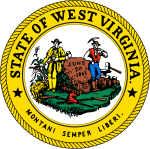 |
The 1864 West Virginia gubernatorial election took place on October 27, 1864, to elect the governor of West Virginia.
| |||||||||||||||||
| |||||||||||||||||
 County results Boreman: 90-100% | |||||||||||||||||
| |||||||||||||||||
| Elections in West Virginia |
|---|
 |
The 1864 West Virginia gubernatorial election took place on October 27, 1864, to elect the governor of West Virginia.
| Party | Candidate | Votes | % | |
|---|---|---|---|---|
| Union | Arthur I. Boreman (incumbent) | 19,353 | 100.00 | |
| Total votes | 19,353 | 100 | ||
| Union hold | ||||
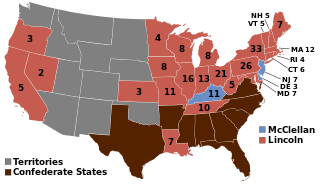
Presidential elections were held in the United States on November 8, 1864, near the end of the American Civil War. Incumbent President Abraham Lincoln of the National Union Party easily defeated the Democratic nominee, former General George B. McClellan, by a wide margin of 212–21 in the electoral college, with 55% of the popular vote. For the election, the Republican Party and some Democrats created the National Union Party, especially to attract War Democrats.

Winchester is the northwesternmost independent city in the Commonwealth of Virginia, United States. It is the county seat of Frederick County, although the two are separate jurisdictions. As of the 2020 census, the city's population was 28,120. It is the principal city of the Winchester metropolitan area with a population of just over 145,000 extending into West Virginia, which is a part of the Washington–Baltimore combined statistical area. Winchester is home to Shenandoah University and the Museum of the Shenandoah Valley.

Clarke County is a county in the Commonwealth of Virginia. As of the 2020 census, the population was 14,783. Its county seat is Berryville. Clarke County is included in the Washington-Arlington-Alexandria, DC-VA-MD-WV Metropolitan Statistical Area.

Berryville is an incorporated town in and the county seat of Clarke County, Virginia, United States. The population was 4,574 at the 2020 census, up from 4,185 at the 2010 census.

In the American Civil War (1861–65), the border states or the Border South were four, later five, slave states in the Upper South that primarily supported the Union. They were Delaware, Maryland, Kentucky, and Missouri, and after 1863, the new state of West Virginia. To their north they bordered free states of the Union, and all but Delaware bordered slave states of the Confederacy to their south.

Francis Harrison Pierpont, called the "Father of West Virginia," was an American lawyer and politician who achieved prominence during the American Civil War. During the conflict's first two years, Pierpont served as Governor of the Restored Government of Virginia and, in this capacity, administered the part of Virginia then under Unionist control before West Virginia's admission to the Union as a separate state. After recognizing the creation of West Virginia, Pierpont continued to serve as Governor of the Restored Government. However, the degree of civil authority he could exercise was minimal for the remainder of the war. Having claimed to be the legitimate Governor of Virginia for the duration of the conflict, Pierpont assumed civil control of the state's entire post-1863 territory following the dissolution of the Confederacy and continued to serve as Governor during the early years of Reconstruction.
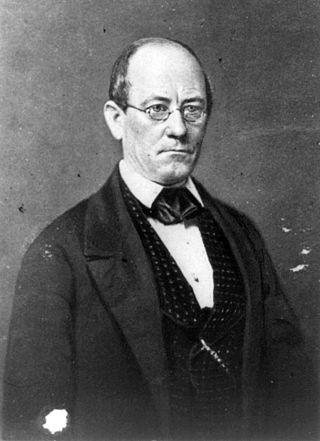
John Letcher was an American lawyer, journalist, and politician. He served as a Representative in the United States Congress, was the 34th Governor of Virginia during the American Civil War, and later served in the Virginia General Assembly. He was also active on the Board of Visitors of Virginia Military Institute.

The Constitution of the Commonwealth of Virginia is the document that defines and limits the powers of the state government and the basic rights of the citizens of the Commonwealth of Virginia. Like all other state constitutions, it is supreme over Virginia's laws and acts of government, though it may be superseded by the United States Constitution and U.S. federal law as per the Supremacy Clause.
The Maryland Constitution of 1864 was the third of the four constitutions which have governed the U.S. state of Maryland. A controversial product of the Civil War and in effect only until 1867, when the state's present constitution was adopted, the 1864 document was short-lived.
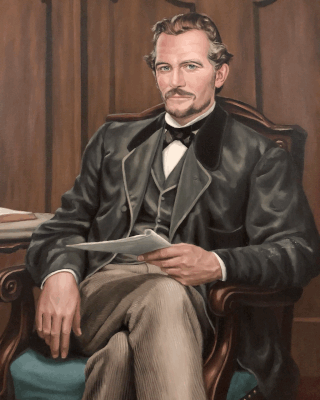
William Erskine Stevenson was an American cabinet-maker, farmer, and Republican politician from Parkersburg, West Virginia. He was the third governor of West Virginia from 1869 until 1871.

Henry Horatio Wells, a Michigan lawyer and Union Army officer in the American Civil War, succeeded Francis Harrison Pierpont as the appointed provisional governor of Virginia from 1868 to 1869 during Reconstruction. A Radical Republican labeled a carpetbagger, Wells was defeated for election in 1869 by Gilbert C. Walker, who also became his appointed successor. Wells then served as U.S. Attorney for Virginia and later for the District of Columbia.

The Virginia Conventions were assemblies of delegates elected for the purpose of establishing constitutions of fundamental law for the Commonwealth of Virginia superior to General Assembly legislation. Their constitutions and subsequent amendments span four centuries across the territory of modern-day Virginia, West Virginia and Kentucky.

The U.S. state of West Virginia was formed out of western Virginia and added to the Union as a direct result of the American Civil War, in which it became the only modern state to have declared its independence from the Confederacy. In the summer of 1861, Union troops, which included a number of newly formed Western Virginia regiments, under General George McClellan drove off Confederate troops under General Robert E. Lee at the Battle of Philippi in Barbour County. This essentially freed Unionists in the northwestern counties of Virginia to form a functioning government of their own as a result of the Wheeling Convention. Before the admission of West Virginia as a state, the government in Wheeling formally claimed jurisdiction over all of Virginia, although from its creation it was firmly committed to the formation of a separate state.

Albert Gallatin Jenkins was an American attorney, planter, politician and military officer who fought for the Confederate States of America during the American Civil War. He served in the United States Congress and later the First Confederate Congress. After Virginia's secession from the Union, Jenkins raised a company of partisan rangers and rose to become a brigadier general in the Confederate States Army, commanding a brigade of cavalry. Wounded at the Battle of Gettysburg and again during the Confederate defeat at the Battle of Cloyd's Mountain, during which he was captured, Jenkins died just 12 days after his arm was amputated by Union Army surgeons as he was unable to recover. His former home is now operated by the United States Army Corps of Engineers.

The RestoredGovernment of Virginia was the Unionist government of Virginia during the American Civil War (1861–1865) in opposition to the government which had approved Virginia's seceding from the United States and joining the new Confederate States of America. Each state government regarded the other as illegitimate. The Restored Government attempted to assume de facto control of the Commonwealth's northwest with the help of the Union Army but was only partly successful. It raised Union regiments from local volunteers but depended upon recruits from Pennsylvania and Ohio to fulfill its commitments. It administered this territory until, with its approval, the area became part of West Virginia in mid-1863.
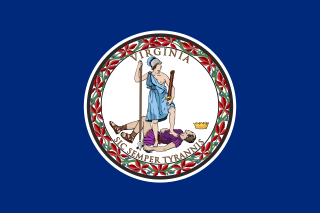
The following outline is provided as an overview of and topical guide to the U.S. state of Virginia:

James Conley Justice II is an American coal baron and politician serving since 2025 as the junior United States senator from West Virginia. A member of the Republican Party, he served from 2017 to 2025 as the 36th governor of West Virginia. Justice was once a billionaire, but his net worth had declined to $513.3 million as of 2021. He inherited a coal mining business from his father that included 94 companies, including the Greenbrier, a luxury resort and National Historic Landmark in White Sulphur Springs.

The 1864 United States presidential election in West Virginia took place on November 8, 1864, as part of the 1864 United States presidential election. West Virginia voters chose five representatives, or electors, to the Electoral College, who voted for president and vice president.

The 1928 United States presidential election in West Virginia took place on November 6, 1928, as part of the 1928 United States presidential election which was held throughout all contemporary 48 states. Voters chose eight representatives, or electors to the Electoral College, who voted for president and vice president.